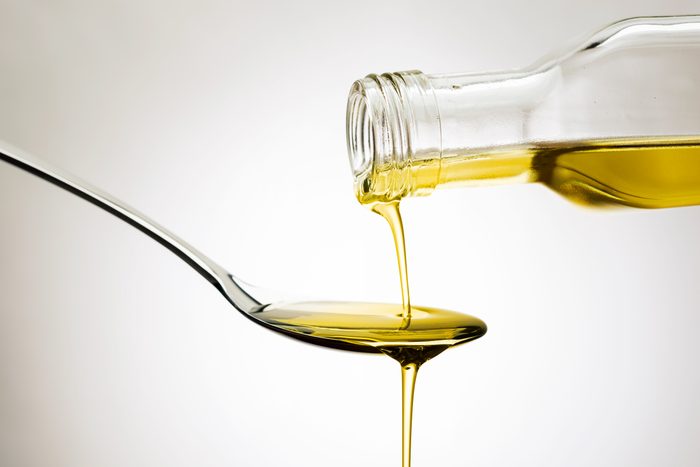When You Use Olive Oil and Other All-Natural Oils as Moisturizer…Do You Absorb the Fat Content? An Obesity Doctor Explains
Updated: May 03, 2023

Using olive oil, avocado oil or coconut oil is a gratifyingly all-natural way to keep skin supple. If you're curious whether it's the same as eating fat, a medical doctor explains.
Avocado oil. Olive oil. Coconut oil: We cook with them because they tend to be healthier ingredients than the trans-fats-filled products that were popular in the past. These oils are so all-around healthy that as more of us focus on “clean beauty” products, these deliciously decadent oils full of healthy fats are also replacing some of our moisturizing creams.
It’s no wonder: Olive oil, avocado oil, and coconut oil are hydration and antibacterial powerhouses. But as they soak in to smooth your fine lines and yield a healthy glow, maybe you’ve wondered whether the fats in these skincare heroes get absorbed into the body, the same way the digestive system absorbs them. Maybe you’ve also wondered: Can this contribute to weight gain?
It’s understandable where this concern comes from. Weight is a complex thing—in fact, between 25 to 70% of your predisposition to be overweight is determined by your genes! Your biology, psychology, and environment each play a major role in the number you see on the scale.
We all know that the fats we eat can contribute to weight gain (even though we do need to regularly consume some healthy fats). But fat-containing oils and moisturizers that we apply topically are a different story.
Here’s How Much Fat You Really Need in a Day, with a Nutrition Expert’s Wisdom
Layers of the skin
The skin is the body’s largest organ, serving as a barrier to protect us from UV light, pathogens, chemicals, and injuries. Made up of three layers—the epidermis, dermis, and hypodermis—it also helps the body regulate temperature.
The outermost layer of the epidermis is the stratum corneum, which comprises 10 to 30 thin layers of cells, called “keratinocytes.”
According to Adam Friedman, MD, a board-certified dermatologist, professor, and chair of the dermatology department at George Washington University, the skin cells of the stratum corneum look similar to that of a brick wall. However, it’s not an impassable brick wall, as one might think. In between each “brick,” there’s a lipid (fat) matrix that prevents water from escaping to keep our skin hydrated, but it also allows for some absorption to take place.
So, wait: Does this mean we can absorb fats into our bloodstream via our skin?
Dermatologists Say This 1970s Anti-Aging Ingredient Is Still the Gold Standard for Gorgeous Skin
Can your skin absorb fatty acids from oil and oil-based moisturizers?
Your skin is definitely porous, containing hair follicles and sweat glands that open directly onto the skin’s surface. But it doesn’t act quite like the generous sponge many think it is, happily soaking up everything you apply.
Dr. Friedman explains that “you can absolutely absorb things systemically through the skin. But in this case, given the skin’s anatomy, you won’t absorb the free fatty acids found in creams.”
Absorption through the skin barrier depends on several factors, including the size of the molecules and where you apply the product. The molecules of most lipids (fats) aren’t small enough to fit through all of the layers of the skin. And the skin’s permeability—based on its thickness—varies throughout your body. Compare the skin on your back to the more delicate skin under your eyes, for example.
5 Ways Menopause Changes Your Skin (with Solutions!), from a Cosmetic Surgeon
Even topical medications designed to permeate the skin, like nicotine patches, don’t get completely absorbed, according to the US Food and Drug Administration.
While unlikely to be metabolized when placed on the skin, an oil such as coconut oil can prevent water loss from the skin, help relieve dryness, and support wound healing. According to Dr. Friedman, the fats in these creams are intended to remain surface-level. Considering oil and water don’t mix—the moisturizers sit on the surface which maintains the hydration of the skin. And because “water is the most dehydrating thing we can put on our skin,” follow a shower with a moisturizer. Slathering up when a little damp can help “lock in” the water, Dr. Friedman adds.
Here’s How Long Your Shower Should Really Take, According to a Doctor on Aging
Bottom line
Have some patches of dry skin that could use extra hydration and a healing boost? Coconut oil, avocado oil, or other oil-based moisturizers can help. The rich fats inside your all-natural, oil-based moisturizer will give you healthy, soft skin but won’t show up later on your scale.
- An Obesity Doctor Reveals the Groundbreaking Truth About the Effect of Aging on Your Metabolism
- Research Shows This Gross (but Common) Behavior May Increase Alzheimer’s Risk
- What Is Laugh Therapy, and Should You Try It?
- Curious About Ozempic for Weight Loss? An Obesity Doctor Just Weighed In With a Healthy Dose of Reality

















